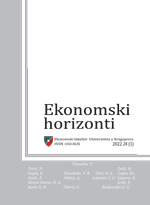SOCIAL ECONOMY TO DEAL WITH SOCIAL EXCLUSION IN POLAND
Social exclusion is defined for the needs of social policy as “ a refusal to follow, or leaving a socially accepted way of life”. This leads often to the emergence of a significant number of social misfits who frequently get used to the condition of being passive, or to “acquired helplessness”, leaning on social welfare institutions, and at times becoming strongly dependent on them. Needless to say, this may lead to the vicious circle syndrome which is a real threat for many people in Poland. Withdrawal and giving up the attempts that might improve their condition resulting from their low self-esteem worsen the prospects of a person or a family. The paper presents the significance of the development of social economy to support the necessary social changes, primarily social integration and reintegration may be analyzed within three basic areas. Firstly, a proper social and economic context for those changes, secondly creating opportunities to find one’s own place, mainly, but not only on the labor market, and thirdly transformations in social attitudes and aspirations.
Key words: social economy, civil society, social exclusion, marginalization, poverty, social integration,
JEL Classification: I13
| Full Text |




